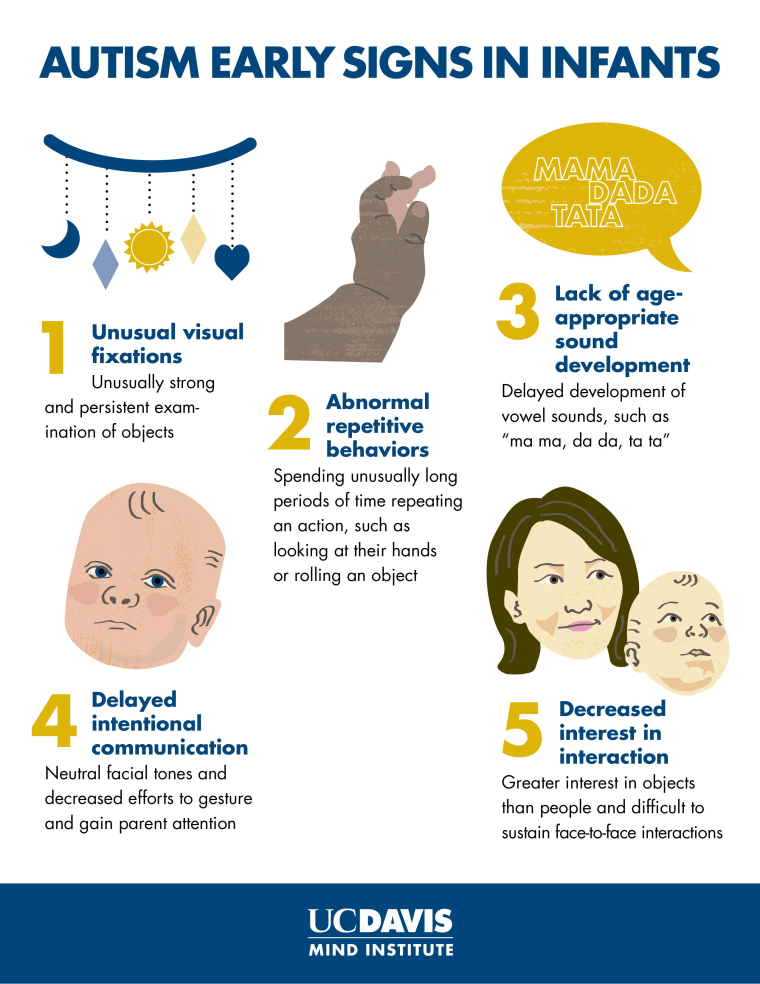Comprehensive guide for working with Autism Spectrum Therapies
Comprehensive guide for working with Autism Spectrum Therapies
Blog Article
Key Symptoms And Signs to Recognize in Individuals With Behavior Autism
When you experience somebody with behavior autism, acknowledging vital indications and symptoms is important. You may discover challenges in social communications and interaction, in addition to a strong requirement for routines. Furthermore, sensory sensitivities can bring about overwhelming experiences. Recognizing these attributes can improve your assistance and interventions, but there's more to uncover concerning exactly how these actions manifest in everyday situations. Let's explore what these signs actually appear like.
Challenges in Social Communications
When you interact with somebody on the autism range, you could discover they struggle with social hints and interaction. These challenges can make social interactions really feel frustrating for them.
In addition, you might discover that they choose regimens and familiar setups, which can restrict their desire to participate in brand-new social scenarios. When they do engage, they might speak about their interests in great detail without discovering if you're interested. This can lead to prejudiced conversations that leave you really feeling disconnected. Recognizing these difficulties can assist you come close to interactions with empathy and perseverance, fostering an extra comfortable atmosphere for both of you.
Difficulty With Verbal and Non-Verbal Communication

Non-verbal communication can be a lot more challenging. You might see a lack of eye call or restricted use gestures, which can make communications really feel unpleasant. Faces might not always straighten with the discussion, bring about confusion regarding their feelings. Acknowledging these indications is essential, as it helps you better assistance and involve with individuals on the autism spectrum. By understanding their interaction obstacles, you can foster more meaningful links and give an extra encouraging setting.
Recurring Actions and Regimens
Interaction obstacles usually go along with other indications of autism, such as repetitive behaviors and a solid preference for regimens. You may discover that people with autism typically participate in specific, repetitive actions, like hand-flapping, shaking, or duplicating expressions. These habits can supply comfort and a sense of control in a typically frustrating world.
When they comply with an organized routine,Regimens are equally crucial; numerous people prosper. You might locate that changes to these routines can result in considerable distress. If they have an everyday routine of consuming breakfast at a certain time or complying with a certain course to college, any type of disruption can cause anxiety.
Acknowledging these patterns helps you understand their behavior and supply support. By fitting their need for routine and permitting recurring activities, you can develop a more comfortable environment that eases their obstacles.
Sensory Sensitivities

Common Sensory Triggers
Sensory level of sensitivities can substantially affect every day life for individuals with autism, as specific stimuli commonly activate frustrating reactions. Typical sensory triggers include loud noises, bright lights, and strong smells. You might discover that sudden noises, like alarm systems or alarms, cause anxiousness or distress. Fluorescent lights in stores can really feel unpleasant and harsh. Appearances can also play a significant role; harsh materials or specific food textures may be intolerable for you. In addition, crowded areas can overwhelm your detects, making it difficult to relax or focus. Understanding these triggers can aid you manage your setting much better. By understanding what impacts you, you can take steps to minimize pain and improve your day-to-day experiences.
Behavioral Responses Clarified
Comprehending your behavioral responses to sensory sensitivities is crucial, as they typically disclose how you engage with the world. You might notice that particular noises, lights, or textures bewilder you, bring about stress and anxiety or discomfort. When confronted with these stimulations, you might take out, cover your ears, and even react boldy. These actions aren't just traits; they're your method of dealing with overstimulation. You might also locate yourself looking for certain sensory experiences, like deep pressure or silent atmospheres, to help ground on your own. Recognizing these patterns aids you understand your demands much better other and can guide exactly how you communicate them to others. By recognizing your sensory sensitivities, you can function towards developing an atmosphere that really feels a lot more comfy and workable for you.
Coping Techniques Review
Acknowledging your sensory level of sensitivities is simply the very first step; now it's time to explore coping strategies that can aid you take care of those experiences successfully. Begin by producing a sensory toolkit tailored to your needs. Establishing an organized routine can likewise give predictability, reducing stress and anxiety around sensory overload.
Limited Passions and Emphasis
While several people develop a variety of rate of interests, those with autism commonly demonstrate limited passions and an intense concentrate on certain topics. You could see that someone with autism can invest hours delving right into their preferred subject, whether it's a certain type of train, a specific flick, or a scientific principle. This intense emphasis isn't just a leisure activity; it can end up being a central component of their identification and social communications.
You may discover that conversations focus on these interests, and they might struggle to participate in broader topics. For them, these concentrated rate of interests give comfort and a feeling of mastery. While it's vital to motivate expedition of new subjects, valuing their passions is just as important. By recognizing and acknowledging these restricted passions, you can foster a helpful setting where they feel valued and comprehended, enabling more significant links and interactions.
Psychological Guideline Troubles
People with autism often encounter difficulties in emotional policy, which can be influenced by their intense emphasis on details passions. You may observe that when an individual is deeply participated in a recommended task, they can experience strong emotions, whether excitement or frustration. This strength often makes it difficult for them to shift gears or handle their feelings when things do not go as prepared.

Variability in Developing Landmarks
When it comes to developmental milestones, you'll notice that individuals with autism frequently show a wide range of variability. You might see a youngster succeed in language abilities however struggle with social interactions.
It's essential to identify that each person's journey is unique. Observing these patterns can aid you recognize their staminas and needs much better.
Often Asked Questions
Just How Is Autism Identified in Children and Grownups?
To diagnose autism in youngsters and grownups, experts evaluate actions, communication abilities, and social communications. If an individual fulfills the criteria for autism range disorder., they commonly use standard tests, meetings, and observations to figure out.
Are There Different Sorts Of Autism Spectrum Disorders?
Yes, there are various kinds of autism spectrum problems, including Asperger's syndrome and prevalent developmental disorder-not otherwise defined. Each type varies in extent and qualities, so recognizing these distinctions can assist you far better support people with autism.
What Treatments Are Effective for Individuals With Autism?
When taking into consideration efficient treatments for people with autism, you'll find choices like Applied Actions Analysis, speech therapy, and work-related treatment. Each approach can assist enhance interaction, social abilities, and daily working tailored to individual requirements.
Can People With Autism Lead Independent Lives?
Yes, individuals with autism can lead independent lives. With the best assistance, abilities training, and sources, you can aid them develop self-sufficiency, handle everyday jobs, and grow in numerous environments, fostering their self-reliance.
Exactly How Can Family Members Assistance Enjoyed Ones With Autism?
You can sustain your enjoyed ones with autism by look what i found creating a structured environment, encouraging their rate of interests, practicing patience, cultivating interaction, and advertising social abilities. Commemorate their success, no issue just how tiny, and construct an encouraging area.
Although several people on the autism range can comprehend and utilize language, they commonly deal with considerable difficulties with site link both verbal and non-verbal interaction. Identifying these indicators is crucial, as it aids you much better support and engage with people on the autism range. You may discover that individuals with autism often engage in details, repetitive actions, like hand-flapping, rocking, or duplicating expressions.Sensory level of sensitivities can significantly affect everyday life for individuals with autism, as certain stimulations usually activate overwhelming reactions.When it comes to developing turning points, you'll discover that individuals with autism usually reveal a broad array of irregularity.
Report this page